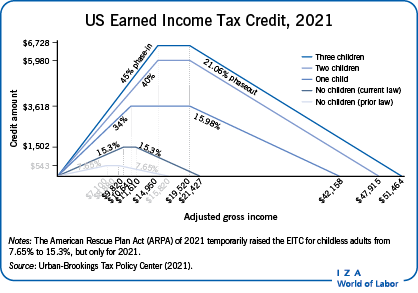Elevator pitch
The earned income tax credit provides important benefits to low-income families with children. At substantial costs (over $70 billion to the US federal government), it increases the incomes of such families while encouraging parents to work more by subsidizing their incomes. But low-income adults without children and non-custodial parents receive very low payments under the program in most years. Many of these adults are less-educated men, whose labor force participation rates and relative wages have been declining for years. They might benefit significantly from a more generous earned income tax credit for childless adults.
Key findings
Pros
The earned income tax credit boosts income and work effort among low-income parents, especially single mothers, and has contributed to the steep rise in employment among single mothers in the 1990s.
Expanding the tax credit to low-income childless adults should raise income and work effort among a group whose earnings and employment have fallen substantially in recent decades.
The statistical evidence shows that work effort among low-income adults is somewhat sensitive to their net wages, and an earned income tax credit for childless adults would raise their net wages.
Cons
The earned income tax credit is already very costly, extending it to childless adults would add to those costs.
The most recent experimental evidence suggests that a childless earned income tax credit would generate only small positive impacts on employment.
Expanding the tax credit to childless low-income adults might discourage marriage and work effort (and raise tax fraud) among childless adults.
